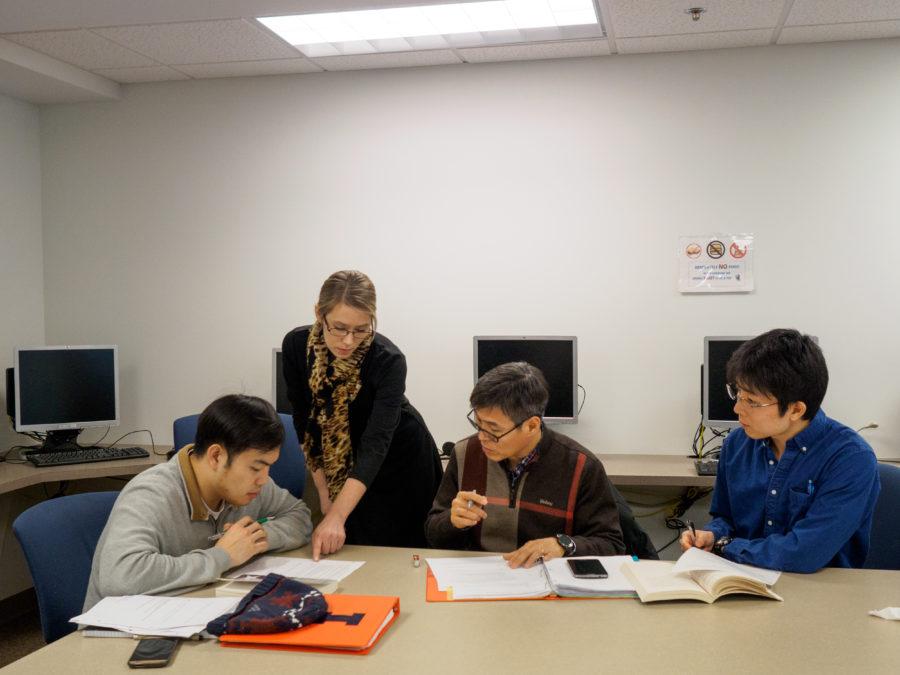Intensive English Institute helps international students learn, apply language
Teacher Amber Dunse talks with students during discussion at the Intensive English Institute on Thursday.
February 14, 2016
Datta Gunuganti was traveling on a bus when he came across something interesting: the Intensive English Institute. Wanting to learn more about English, he decided to give it a try.
“I shot an email, and they were kind enough to give me the information I needed,” he said. “A week later, I went online and applied.”
Tucked between McDonald’s and Subway on Green Street sits the University’s Intensive English Institute. The Institute is a program designed for people from international countries who are looking to acclimate themselves to universities and colleges within the United States. The Institute helps its students build English-speaking skills that can aid their professional and scholastic career. Students learn presentation skills, build resumes and write papers, among other activities.
Inside, students exit from classroom to classroom and sit in a lounge area, emulating a condensed college campus.
“Our international students are here exclusively to study English full time. We do have part-time students, but most of our students are here full time, which means they take 20 hours a week with just English classes,” said Rachel Newell, IEI Outreach Lecturer.
Get The Daily Illini in your inbox!
The students sitting inside the classrooms, however, aren’t enrolled in the University. They don’t take credits that can be transferred to other schools. But Newell said there is still a goal in mind for these students.
“Many of them have a goal of going into a graduate or undergraduate program in the United States or English speaking countries,” Newell said.
The main purpose of this program is to assist students in reaching their personal goals, whether they just want to enhance their English skills or gain professional training.
“I think for every student it’s going to be different,” Newell said. “For some students, this is their first time out of their home countries. For some students, they have traveled a lot, and they’re a bit more aware of culture shock and cultural-adjustment issues. Many of our students come here first before getting into an academic program.”
But the program does not just limit its lessons to student-aged people. Some students sitting inside the classroom are over 65 years old or parents of current University students.
“There is a mother; her daughter is a U of I student from Korea and her daughter is graduating this semester, so she wanted to come,” Newell said. “She just retired from her teaching job in Korea and decided to come here for a semester to study English and be with her daughter.”
The Institute also offers programs such as “convo partners,” where students can choose to be matched with a volunteer from the C-U community based on similarities in age, gender and interest in having traditional conversations in English.
“I recruit volunteers who are students on campus, graduate students and people who work on campus or people who live in the community,” Newell said. “They meet with that partner once a week for English conversation practice.”
Gunuganti said his “convo partner” is very beneficial.
“Today, I met with my convo partner. We just talk about how things are,” Gunugauti said. “I think it really helps me develop my language skills and understanding the culture here. It’s very helpful in integrating myself into America.”
Programs and activities like these are implemented and planned along with interns at the Institute. Interns are undergraduate students at the University and help organize activities to get the students involved.
“We plan the weekly activities and also the weekend activities. For example, this week they have chit-chat, which is where we provide a time for them to practice conversational English outside of the classroom, so they can practice their speaking and listening skills,” said Wonhee Yun, senior in Engineering. “We also have other activities where they can talk about what they had to deal with where they’re from and the struggles they have encountered while being here. We plan activities like that, so they can engage in American culture and get to know each other better.”
Gunuganti said each day he has four hours of classwork along with two hours of homework Monday through Friday.
“It can get a little difficult,” Gunuganti said.
But Gunuganti said he still enjoys his time at the Institute.
“Group work is my favorite part,” Gunuganti said. “I enjoy working with my classmates.”
For Gunuganti, the Institute has made a difference in his English-speaking endeavors.
“The teachers are very helpful. They help with any problems we have with the English language,” he said. “It’s more than just learning English. You learn how things work over here (in America), and you get to learn about the culture.”







